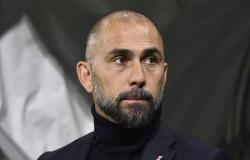“Remembering the ideal legacy of those founding events is a civic duty and a precious opportunity to reflect together on the reasons that animate the life of our community, inserted today in the broader community of the European Union which we have decided to give life to with other free peoples of the continent and whose sovereignty we will consecrate, in a few days, with the election of the European Parliament”. These are the words of the President of the Republic Sergio Mattarella, read by the prefect of Piacenza Paolo Ponta during the official ceremony of Republic Day in Piazza Cavalli. The head of state recalled the choice made in 1946 by the Italian people, that for the Republic, which “wrote a decisive page of democracy and laid the foundations for a renewed social pact, which would be fully articulated in the Constitutional Charter. An outcome which was reached after the tragic war events and the struggle for liberation from Nazi-fascism, punctuated by multiple episodes of heroism and brutal massacres, the eightieth anniversary of which is being commemorated this year with emotional participation in numerous locations.” The celebrations continued in the prefecture with the awarding of the honors of the Order of Merit of the Italian Republic: the prefect Paolo Ponta awarded two new Officers and eight Knights.
Prefect Ponta reads the speech, behind him the city authorities
Photo galleryRepublic Day in the square
THE SPEECH OF THE PRESIDENT OF THE REPUBLIC MATTARELLA
FIVE QUARTERS – The ceremony opened with the traditional flag raising, after a review of the authorities and representatives of the armed forces and law enforcement. At the end of the speech that Prefect Ponta read from the stage set up on one of the sides of the rectangle in the shadow of Palazzo Gotico, theCinqueQuarti Orchestra – two groups of one hundred children each, made up of pupils from elementary and middle schools in Piacenza and its province with more than twenty different nationalities, now united in a single complex – performed four songs. A project which, as the head teacher of the fourth circle recalled Simona Favari, which gave life to the orchestra’s experience, is “aimed at developing talents, promoting social inclusion, preventing school dropout and youth disadvantage”, is inspired and draws its educational foundations from the Venezuelan ‘El Sistema’ founded by José Antonio Abreu and brought to Italy by maestro Claudio Abbado. “This approach – explained Favari – is an educational model that puts music at the centre, understood as a tool for global and multidimensional development, functional to the learning and well-being of the subject, within a framework of universal and inclusive values: equality, rights , participation, community, sustainability, respect for diversity, non-violence, trust, honesty, courage, joy, love, optimism and hope”. “My thanks to Prefect Ponta – said Favari on the sidelines of the ceremony – who wanted us to be part of this important moment, citizenship education is a focus of our project and being able to involve children in the ceremony commemorating the birth della Repubblica is also a very significant moment for them from an educational point of view, with their work and dedication they played very well, for us it was a nice moment of collective celebration”.
Simona Favari
CHILDREN AND THE CONSTITUTION – The performance of the four pieces – “Aria” by Robert Schumann, “Chorale” by Ignaz Joseph Pleyel, “Capriccio italiano” op.45 by Pëtr Il’ič Tchaikovsky and “Pump and Circumstance” by Edward Elgar – was interspersed with some interventions by the children themselves, who they commented on selected articles of the Italian Constitution. Assanatoucommenting on article 1, said that “in the orchestra there is no discrimination because people are not judged, no one is made fun of for how they play”. Valentina, on article 6, specified that “in the orchestra we are treated well even if sometimes we make mistakes. We help each other when we forget parts. When someone forgets their instrument, another one is lent to them. We also help each other among children from other schools, because we have become friends.” And then Thomas commented on article 13 stating that “Every child can express how they feel when they play with other children and when we make mistakes we help each other without criticizing ourselves”. Joy, on article 15 of the Constitutional Charter, said that “In the orchestra you have to have fun because, if you are angry, you can’t play well. We need to be together, because otherwise we feel alone. We have increased our friendships.” Serena he commented on article 28 as follows: “Every child has the freedom to play the instrument suitable for him and learn together with his classmates in order to express his emotions”. In the end, Trajche, on article 31, reiterated that you can play even if you are young because there is no age for playing. You can always play, because no one can tell you when and where to play. Nobody is excluded: everyone can participate.”
“In the collective everyone discovers their own talent” The CinqueQuarti method for learning music and becoming great (READ THE CINQUEQUARTI ORCHESTRA PROJECT)






